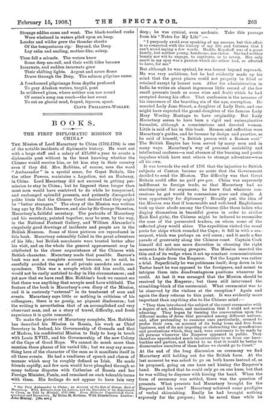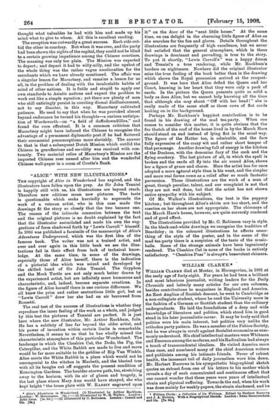BOOKS.
THE FIRST DIPLOMATIC MISSION TO CHINA.*
THE Mission of Lord Macartney to China (1792-1794) is one of the notable incidents of diplomatic history. He went out with a large staff and a salary of 215,000 a year to create a diplomatic post without in the least knowing whether the Chinese would receive him, or let him stay in their country even if they did. Mrs. Robbins, of course, uses the word " Ambassador " in a special sense, for Great Britain, like the other Powers, maintains a Legation, not an Embassy, in China. Lord Macartney did not succeed in getting per- mission to stay in China ; but he lingered there longer than most men would have contrived to do while he temporised, and exchanged splendid presents, and patiently disregarded polite hints that the Chinese Court desired that they might be"better strangers." The story of the Mission was written long ago by Sir John Barrow, and also by Sir George Staunton, Macartney's. faithful secretary. The portraits of Macartney and his secretary, painted together, may be seen, by the way, in the National Portrait Gallery, and William Alexander's -singularly good drawings of incidents and people are in the British Museum. Some of these pictures are reproduced in this book. Macartney ostensibly failed in the great adventure of his life ; but British merchants were treated better after his visit, and on the whole the general appeasement may be attributed to the closer acquaintance of the Chinese with British character, Macartney made that possible. Barrow's book was not a complete account because, as he said, he 'carefully avoided the use of all private anecdote and corre- spondence. This was a scruple which did him credit, and would not be easily matched to-day in like circumstances; and yet now that we have read Mrs. Robbins's book we cannot see that there was anything that scruple need have withheld. The feature of the book is Macartney's own diary of the Mission, and it is curiously "external" in its treatment of men and events. Macartney says little or nothing in criticism of his colleagues; there is no gossip, no piquant disclosures ; but the writing is nevertheless that of an accomplished and very -observant man, and as a story of travel, difficulty, and fresh experience it is quite romantic.
To make the picture of Macartney complete, Mrs. Robbins -has described his Mission in Russia, his work as Chief -Secretary in Ireland, his Governorship of Grenada and that -of Madras, his confidential Mission to Italy to keep in touch with Louis XVIII., and his Governorship of the new Colony .of the Cape of Good Hope. We cannot do much more than mention these phases of his varied life ; but we may say some- -thing here of the character of the man as it manifests itself in all these events. He had a readiness of speech and charm of manner which may be roughly defined as Irish. He made -friends rapidly, and few men would have ploughed through so -many tedious disputes with Catherine of Russia and her Foreign Minister, Panin, and remained on such tolerable terms -with them. His feelings do not appear to have lain very * Our First Ambassador to China : an Account of the Life of George, Earl of 3facartney. With Extracts from his Letters, and the Narrative of his Experiences -in China, as Told by Himself, 1737-1806. From Hitherto Unpublished Corre- spondence and Documents. By Helen H. Bobbins. With Illustrations. London : John Murray. [Ns, net.]
deep ; he was cynical, even sardonic. Take this passage from his "Notes for My Life"
"I purposely avoid ever speaking of my amours, but this affair is so connected with the history of my life and fortunes that I can't avoid saying a few words. Madlle. Keyshoff was of a great family, but neither young, handsome, nor clever. She had neither beauty nor wit to engage, to captivate, or to retain. Her only merit in my eyes was a passion which she either had, or affected to have, for me."
But although he was cynical, he was honest beyond reproach. He was very ambitious, but be had evidently made up his mind that the great places could not properly be filled or retained except by honest men. After his administration in India he writes an almost ingenuous little record of the few small presents (such as some wine and fruit) which he had accepted during his office. That confession is the measure of his innocence of the besetting sin of the age, corruption. He married Lady Jane Stuart, a daughter of Lady Bute, and one might have expected the grand-daughter of the famous Lady Mary Wortley Montagu to have originality. But Lady Macartney seems to have been a rigid and unimaginative formalist, although a conscientious and devoted woman. Little is said of her in this book. Reason and reflection were Macartney's guides, and he became by design and practice, as he said of himself, "a British person with a Roman soul." The British Empire has been served by many men and in many ways. Macartney's way of personal amiability and intellectual coolness—a real absence of the burning and poetic impulses which have sent others to strange adventure—was all his own.
It was towards the end of 1791 that the injustice to British subjects at Canton became so acute that the Government decided to send the Mission. The difficulty was that Great Britain could offer no quid pro quo. China was supremely indifferent to foreign trade, so that Macartney bad no starting-point for argument ; he knew that whatever con- cessions he got would be concessions pure and simple. A true opportunity for diplomacy ! Broadly put, the idea of the Mission was that if honourable and well-bred Englishmen took up their abode among the Chinese (like those ladies who display themselves in beautiful gowns in order to civilise East End girls), the Chinese might be induced to reconsider the case of the persecuted traders, on whom some of the reflected glory would shine. The expedition visited the usual ports for ships which rounded the Cape ; it fell in with a sea- serpent, which was perhaps an evil omen ; and it made a fine parade of generosity along the Chinese coast. Captain Cook himself did not use more discretion in choosing the right moments for disbursing gewgaws. The Mission inserted the thin end of its wedge when it set up constant communications with a Legate from the Emperor. Yet the Legate was rather a trial. Superficially he was politeness itself; deep down in his Tartar heart he was opposed to the foreigners, and meant to intrigue them into disadvantageous positions whenever he could. At last it was arranged that the Mission should be received by the Emperor; but there still intervened the stumbling-block of the ceremonial. What ceremonial was to be observed by the visitors at the reception ? Again and again the diary returns to this point. It was evidently more important than anything else to the Chinese mind :— "They then introduced the subject of the court ceremonies with a degree of art, address, and insinuation that I could not avoid admiring. They began by turning the conversation upon the different modes of dress that prevailed among different nations, and, after pretending to examine ours particularly, seemed to prefer their own, on account of its being loose and free from ligatures, and of its not impeding or obstructing the genuflexions and prostrations which, they said, were customary to be made by all persons whenever the Emperor appeared in public. They therefore apprehended much inconvenience to us from our knee- buckles and garters, and hinted to us that it would be better to disencumber ourselves of them before we should go to Court."
At the end of the long discussion on ceremony we find Macartney still holding out for the British form. At the last moment he was asked to go on both knees instead of, as he proposed, going on one knee and kissing the Emperor's hand. He replied that he could only go on one knee, but that he was willing to dispense with kissing the hand. When the form of ceremony was settled, there was the question of presents. What presents had Macartney brought for the Emperor and his sons ? Macartney achieved some prodigies of verbal skirmishing. Really he had brought nothing expressly for the purpose ; but he saved time while he
thought what valuables be bad with him and made up his mind what to give to whom. All this is excellent reading.
The reception was outwardly a great success. Each side out- bid the other in courtesy. But when it was over, and the party bad been shown the sights of the capital, they could not be blind to a certain growing impatience among the Chinese courtiers. The meaning was only too plain. The Mission was expected to depart ; and depart it had to willy-nilly, and the upshot of the whole thing was the rather vague amelioration for the merchants which we have already mentioned. The affair was a singular lesson for Macartney, and remains a lesson for us all, in the problem of dealing with the incalculable habits of mind of other nations. It is futile and stupid to apply our own standards to Asiatic nations and expect the problem to work out like a simple equation ; yet there are plenty of men who still untiringly persist in courting dismal disillusionment, not to say disaster, in this way. Macartney cultivated patience. He used to say that when he was provoked almost beyond endurance he turned his thoughts—a curious anticipa- tion of Wordsworth—on "a field of daffodovvndillies," and found the cure effectual. It is a common criticism that Macartney might have induced the Chinese to recognise the advantage of a permanent diplomatic post if he had flattered their ceremonial preconceptions more slavishly. The answer to that is that a subsequent Dutch Mission which outdid the Chinese in genuflexions and servility was received with con- tumely. Two material relics of Macartney's Mission are the imported Chinese rose named after him and the wonderful Chinese wall-paper in a room of Coutts's Bank.





































 Previous page
Previous page